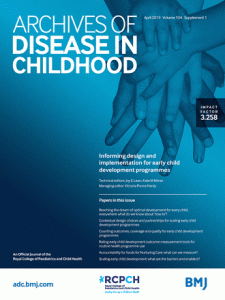
This is a critical moment for global action in early child development (ECD). Worldwide, an estimated 250 million children under the age of five are at risk of not reaching their developmental potential. The Sustainable Development Goals and the Global Strategy for Women’s, Children’s and Adolescents’ Health (2016-2030) envision that every child has the opportunity to thrive and the 2018 WHO & UNICEF Nurturing Care Framework provides a policy framework for this.
To support the shift to large-scale implementation for ECD, policymakers and programmers require practicable suggestions for context-specific design and implementation interventions.
This series of papers, with 33 authors from over 20 institutions in Europe, North America, Asia, Latin America and Africa, is aimed at informing design and implementation of early child development programmes in low- and middle-income countries around the world.
Building on the evaluation of the Grand Challenges, Canada, Saving Brains portfolio and additional analyses, we discuss evidence to inform decision points encountered in scaling of early child development programmes.
Contents: Volume 104, Issue S1, (2019)
Paper 1: Contextual design choices and partnerships for scaling early child development programmes
Paper 2: Counting outcomes, coverage and quality for early child development programmes
Paper 3: Rating early child development outcome measurement tools for routine health programme use
Paper 4: Accountability for funds for Nurturing Care: what can we measure?
Paper 5: Scaling early child development: what are the barriers and enablers?